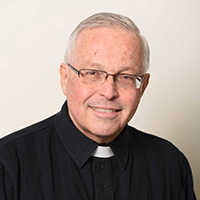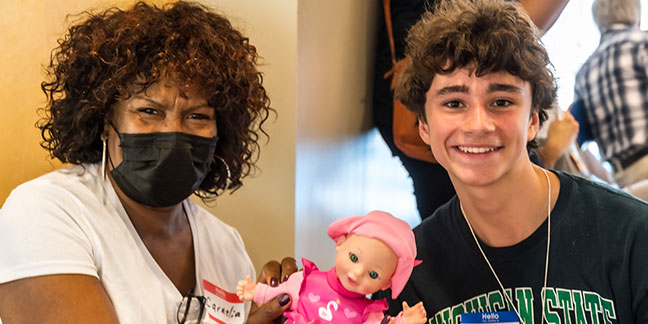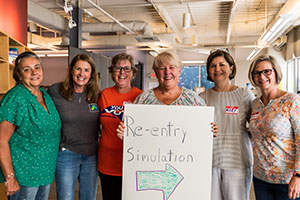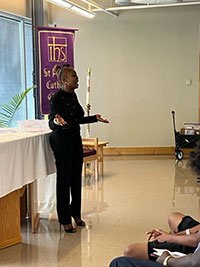 Monsignor Thomas CasertaCHARLOTTE — Bishop Peter Jugis and priests of the Diocese of Charlotte will attend their annual Priests’ Retreat Oct. 2-7 at the diocese’s Living Waters Reflection Center in Maggie Valley.
Monsignor Thomas CasertaCHARLOTTE — Bishop Peter Jugis and priests of the Diocese of Charlotte will attend their annual Priests’ Retreat Oct. 2-7 at the diocese’s Living Waters Reflection Center in Maggie Valley.
All the conferences from this year’s retreat will be recorded to share with the Franciscan Friars of the Renewal, missionary priests in Nicaragua. The government of Nicaraguan President Daniel Ortega has long persecuted the Catholic Church, recently arresting more than 100 people, including some priests who are being held in Managua’s notorious El Chipote prison. Bishop Rolando Álvarez is among those imprisoned, after an Aug. 19 raid on his offices.
“We want the missionaries of Nicaragua to benefit from our conferences for their canonical retreat,” says Father Cahill, pastor of St. Eugene Church in Asheville and retreat coordinator. “Because the Church there is being persecuted, we want to partner with the Franciscan Friars of the Renewal to help bring about spiritual renewal and hope.”
Conferences will be centered around the topic “The Priest in a Time of Eucharistic Revival: Blessed, Broken and Given.”
This year’s retreat master is Monsignor Thomas Caserta from the Diocese of Brooklyn, N.Y. Monsignor Caserta has served as an associate pastor, youth retreat director and, for 22 years, as director of spiritual formation at his diocese’s seminary college.
Monsignor Caserta also served for 10 years as director of Priestly Life and Ministry for the Brooklyn diocese and is the coordinator of the Courage International apostolate, a Catholic ministry that offers support for those who experience same-sex attraction, as well as their families.
Besides daily Mass, talks by Monsignor Caserta and time for reflection, the priests will take time on their retreat “to praise God for this blessed golden anniversary of the diocese and honor the anniversary as a prayer intention when we pray a rosary together,” Father Cahill said.
— SueAnn Howell
Make a retreat
Living Waters Catholic Retreat Center is tucked away in the picturesque Smoky Mountains and offers private, group and diocesan youth-sponsored retreats, as well as preached, directed and nature retreats. There are also many opportunities for hiking and meditative walks. To learn more about this retreat center, sponsored by the Diocesan Support Appeal, go to www.catholicretreat.org.
‘30 days out: the re-entry simulation’
 Pictured are Carmelia Stephens and Colin Patcha, a member of St. Peter Parish and a sophomore at Charlotte Catholic High School. (Photos provided by Jenny Cox)CHARLOTTE — Some 70 members of St. Peter Church and the larger community came together Aug. 27 to put themselves in the shoes of those formerly incarcerated.
Pictured are Carmelia Stephens and Colin Patcha, a member of St. Peter Parish and a sophomore at Charlotte Catholic High School. (Photos provided by Jenny Cox)CHARLOTTE — Some 70 members of St. Peter Church and the larger community came together Aug. 27 to put themselves in the shoes of those formerly incarcerated.
They participated in “30 Days Out: The Re-entry Simulation,” a program sponsored by Re-entry Partners of Mecklenburg County that simulates the struggles faced by more than 20,000 people returning home from prison in North Carolina each year.
The project was one way the parish is contributing to the Diocese of Charlotte’s “50 Acts of Charity,” a yearlong initiative by the diocese’s parishes, schools and ministries to give back to the community while celebrating the diocese’s 50th anniversary in 2022. Acts of Charity have included corporal and spiritual works of mercy – everything from food and diaper drives to prayer and taking action in solidarity with the poor and others in need.
“As a Jesuit parish, one of our apostolic preferences is walking with the excluded,” said Joanna Patcha, a member of St. Peter’s Social Justice Ministry who helped organize the event. “The re-entry simulation provided just a glimpse into the struggles suffered by those formerly incarcerated, some of the most stigmatized in our society. We hope people walk away with more understanding, compassion and awareness of the need for change.”
Each participant was given an identity – complete with name, criminal background, family situation and life scenario. Some began with resources and family support. Others did not. All had to navigate one month post-release, broken up into four 15-minute segments. Tasks included getting identification from the DMV, finding a job, securing housing, managing childcare, buying food, going to the bank, meeting with a probation officer, seeking public assistance and other tasks that people just released from prison have to tackle.
Every station required a bus ticket before any service was provided, as many returning from prison do not have transportation. Some participants were given crying babies to carry. Others were provided with peer support specialists to guide them. Vague and confusing directions, limited time to complete tasks, and the warm  Members of St. Peter Church who organized the event in collaboration with Re-entry Partners of Mecklenburg County are (from left) Carmen San Juan, Joanna Patcha, Kate Dennstaedt, Stephanie Fielder, Mary Stokes and Jenny Cox. temperature of the building (the air conditioning system broke, unplanned) made for a taste of the harsh reality many people experience as they start to rebuild their lives.
Members of St. Peter Church who organized the event in collaboration with Re-entry Partners of Mecklenburg County are (from left) Carmen San Juan, Joanna Patcha, Kate Dennstaedt, Stephanie Fielder, Mary Stokes and Jenny Cox. temperature of the building (the air conditioning system broke, unplanned) made for a taste of the harsh reality many people experience as they start to rebuild their lives.
“What I felt today was emotional. I was uncomfortable, frustrated and even a little desperate,” said Major David Robinson of the Charlotte-Mecklenburg Police Department, who joined Charlotte City Council member Reneé Johnson at the simulation. “I haven’t experienced that kind of struggle in my own life because of where I was born. The most important tool I carry every day is not anything on this belt, not my bulletproof vest, not my radio and certainly not my gun. It’s empathy.”
The two-hour event ended with a group debrief and a testimonial by Ebony Thomas, who served 10 years in prison and shared her experience of the struggle to return home.
“There’s way more to it than breaking the law. A felony follows you – 20 years later they still want to know and you have to check that box,” she said.
Thomas, who now owns V.M. Transportation Service and another company that hire those who have been in prison, said she never wants others to experience the rejection and depression she felt returning to society.
“I was denied a job and housing and was in a really depressed state. I never want anyone to experience what I did.”
Participants left with resources to learn more and take action in helping those returning to society.
— Jenny Cox
 Ebony Thomas, who spent 10 years in prison, shares her personal story of struggle in returning home. She now owns two businesses that hire ex-felons and gives second chances.
Ebony Thomas, who spent 10 years in prison, shares her personal story of struggle in returning home. She now owns two businesses that hire ex-felons and gives second chances.

